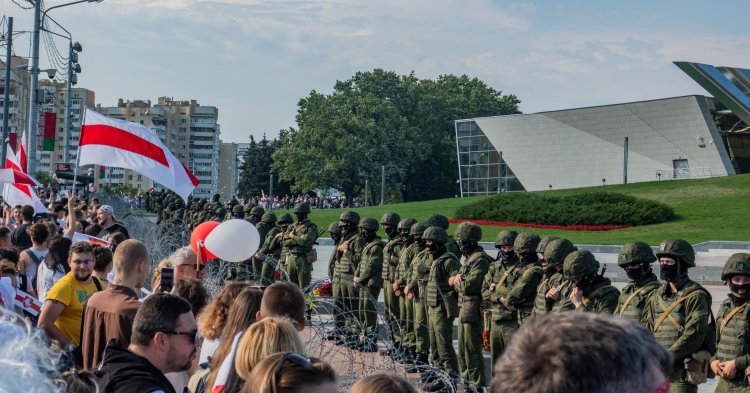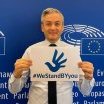Two months ago, in Belarus, a political prisoner Vitold Ashurak died in the colony at the age of 50 from a cardiac arrest, according to the government. Nevertheless, his wife reported that he never had heart problems. He had been detained for more than 7 months and wrote in one of his last letters that the administration of the colony started to mark political prisoners with a yellow patch. There haven’t been any letters from him in recent weeks.
Last week, 21 people were recognized as political prisoners, completing the number of 566 people currently detained for political reasons in Belarus. And this news is not from South America in the 70s. This news is from the middle of Europe in 2021.
Stuck in the “one of the post soviet countries” stigma, Belarus had never been in focus of world news. The existence of Belarus has become known around the world since summer of 2020. To catch the attention, just simple elements were needed: one woman standing for her politically detained husband; two more women to unite for a joint presidential election campaign that made everyone remember about their civil rights and human dignity; 400.000 people gathered to peacefully protest against the 26-year opressive regime; the first murder of a protester by the police on the night after the announcement of the fraud election results; and mass tortures of the protesters in the detention centers on the days after.
Sounds shocking? Imagine Belarusians, who lost a quarter of their population of 10 millions, to the fight against crimes against humanity just 70 years ago.
Standing just across the border from the “stronghold” of democracy and human rights, the violent nature of oppression, forced disappearance and imprisonment of political opponents were known long before 2020. Shortly after the first and only fair presidential electoral victory in 1994, numerous changes in the governmental system led to a growing autocracy, pushing former supporters to switch to the opposition. In May of 1999, Yuryi Zakharenka, the former Minister of Internal Affairs, soon joined the opposition,was kidnapped, and disappeared without a trace. Four months later, the same scenario happened to Viktar Ganchar who earlier headed the alternative CEC during the alternative presidential election. Viktar and his friend, publicist Anatoliy Krasousky were together in a car when they were kidnapped. Upon this, with the help of the two fully obeying ministries of Internal Affairs and of Justice, criminal cases were fabricated against fake individuals.
Violent oppression and repressions of the political opposition - be it isolated individuals or the entire nation - had become an automated scheme. And observing a deepening concern and imposed sanctions, the perpetration was becoming less apprehensive with years, and more agile.
The sanctions were affecting the people of Belarus more than the target - the already weak economy declined even further, and in the cells, political prisoners were punished by the guards for being the reason for the sanctions. Later, the governmental strategy changed to the release of prisoners in exchange of lifting international sanctions guarantees. The political prisoners turned into hostages. Nevertheless, the tricky mechanism was working for ages and even considered “satisfactory” [1] for being on the way to the development of democracy. Somehow, the open abuse of power and election results falsification that served as initial reasons for the sanctions were eventually getting missed in the deal. Left with impunity and never being accountable for the wrongdoings, the regime’s well-being was undisturbed.
For receiving the title of the “terror”, again just simple things needed: hijacking an international civilian plane with a fighter jet flying next to it for arresting Raman Pratasevich - one of the administrators of the Telegram channel that was informing the Belarusian awakening and protest for democracy in summer 2020.
While the regime switched to a kafkian pattern - manhunting in elevators of residential buildings, forcefully breaking into the apartments of protesters, detentaining them, shutting water and heating systems down in the protesting neighborhoods, fabricating criminal cases and sentences going up to 9 years in penal colonies, invisible and hence almost impossible to prove torturing detainees, including by depriving them from medical assistance and necessary medicine - it captured less and less of international media attention, and the world’s interest in the Belarusian struggles waned away.
The blatant aircraft hijacking holding European citizens on board is what the world needed to finally recognize what Belarusians had already been crying out for long, that the people are in the hands of terrorists and that the whole country is under governmental terror.
To give you some illustration
A minor, political prisoner Mikita Zalatarou, as many other political prisoners, is deprived of medical assistance. His medicine for epilepsy are refused to him, with a comment from the guard: “You are political [prisoner], you will die here”.
Two months ago, a 18-year-old Dmitry Stahouski orphan committed suicide explaining in his posthumous post on social media that if not for the moral pressure of the investigative committee he would not have dared to do it. He was involved in the criminal case for participating in the mass protests on August 9-11, 2020.
Former policeman Dmity Kulakouski, detained for leaving his position after observing the regime’s violence, had to swallow a metal spoon to receive long-needed medical assistance.
Last month, political prisoner Stsiapan Lapytau, an arborist whose work was to heal the trees. Beaten and with abrasions, he punctured his throat with a pen during his trial in the attempt of suicide as after 51 days of so-called “pressure hut” [2], he had beenthreatened with tortures and persecution of his relativesand neighbors and another “pressure hut” if he did not pledge his guilt. For what? For asking IDs from the policemen who wanted to paint over the wall with a symbol of the protests - two DJs turned on the oppositional song “Changes” during the pro governmental event.
566 political prisoners are now either serving their sentence or awaiting their trial, around 200 more are detainedbut due to the procedure have not yet been recognized as political prisoners. Since last year, the number has been growing continuously associated with brutal attacks on offices of independent media and civil society organizations, breakages in private apartments and, always, with disproportionate violence. The correspondence of political prisoners is censored making it harder to know about their real condition, and their general connection with the outside world is restricted. Their families are under severe psychological pressure as the special services often intimidate them and establish control over their life - tracing their social contacts, communication, work and location. People have fled in big numbers until the land borders were ordered to be locked and, now, the air exit is blocked too. And as it is clear - repressions tend to intensify under sanctions.
Is death the only way to freedom?
There is something that you can do. You can join the actions of Politzek.me - on the website, you can befriend a political prisoner and choose a way you want to help them - from writing a letter to direct help to their families. You can also take a bigger action such as launching a campaign or making an appeal to your government to advocate for the release of all political prisoners in Belarus. After the massive extermination of independent media and human rights organizations in Belarus, now it is our duty to speak for them. You can contact Politzek.me and we will try to navigate your support. Just make it public as we believe that evil deeds hate the light.






Follow the comments: |
|
